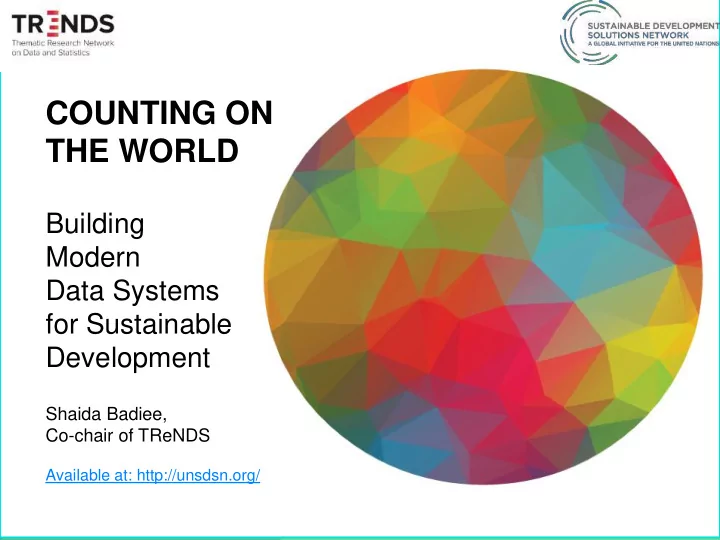

COUNTING ON THE WORLD Building Modern Data Systems for Sustainable Development Shaida Badiee, Co-chair of TReNDS Available at: http://unsdsn.org/
DATA-POP The Law, Politics and ALLIANCE Ethics of Cell Phone White Paper Data Analytics April 2015
INCENTIVES FOR THIS REPORT • A lot of excitement about harnessing the data revolution. • A lot of entities trying to do interesting, small-scale pilots to test new methods and technologies. A real commitment from across the UN and governments to try and harness the power • of the data revolution. • But very little guidance on how to do it …. A World That Counts and Cape Town Global Action Plan were the first steps, • But need to take a long-term view and think about the eventual systems we are trying to create. • What does a n new data ecosys ystem m look ok like? ? How is it governe rned? d? What capacities es are needed to get there? • It can’t be designed by the UN, member states, or private companies alone. • Requires multi-sectoral / multi-stakeholder systems thinking. • Need to think about needs of SDG agenda, but also Sendai, Paris and countries’ specific requirements.
A MODERN STATISTICAL SYSTEM … A 21st – century data system that is fit for purpose to both monitor and achieve the SDGs should help governments to: 1. Plan and prepare for the future, 2. Manage and govern more effectively, 3. Monitor historical progress.
…. AND HARNESS THE SKILLS OF A HUGE ARRAY OF DATA PRODUCERS.
SO HOW DO WE BREAK DOWN INSTITUTIONAL BARRIERS, FOSTER NEW PARTNERSHIPS, AND BUILD CAPACITY?
GOVERNANCE AND LEADERSHIP 1. Changing role of NSOs 2. SDG Data Roadmaps. 3. A High-Level Panel on the Data Revolution. 4. Expanded UN Statistical Commission (& IAEG-SDG ).
PRINCIPLES AND STANDARDS 1. A new global Data Compact. 2. Committee(s) to develop detailed standards to ensure data integrity across public and private actors. 3. International agencies support LICS to establish: ▪ essential data protection safeguards like data protection laws, ▪ strong legal and regulatory data frameworks within which non-governmental actors should operate.
TECHNOLOGY, INNOVATION AND CITIZEN- LED ANALYSIS 1. Data sharing: Annual data sharing challenge at WEF. 2. Interoperability: Update UN Classifications Registry. 3. CGD: Creation of a “City Group”.
CAPACITY AND RESOURCES 1. Partnership between UNSC and UNESCO / GPE for data literacy training in schools. 2. A global financing facility for statistics. 3. GPSDD-facilitates a global PPP sponsorship platform for national statistical capacity.
Recommend
More recommend